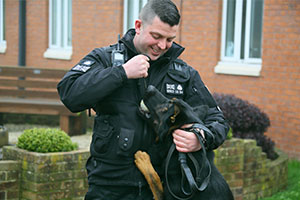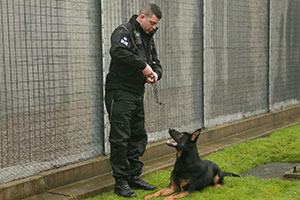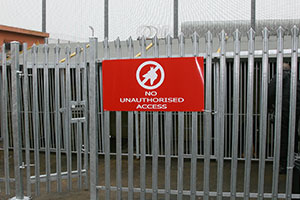Custodial Review's Steve Mitchell and Wendy Hewitt visited HMP Lowdham Grange, Notts, to find out why it had introduced a permanent patrol dog section. Lowdham Grange is a Category B prison for adult male prisoners with more than four years left on their sentence. It is operated and managed by Serco. It has a capacity of 930 long-term prisoners.
We spoke to Mark Hanson, the prison’s Director, and to Peter Chojnacki, a prison officer with the rank of prison dog handler. Peter’s aspiration to specialise in dog handling began during his initial prison officer training, 12 years ago, when he attended a dog handling demonstration. During his subsequent career Peter took the initiative to learn as many aspects of how prisons are run as possible with a view to being appointed as a dog handler.
Custodial Review (CR): Peter, tell me about HMP Lowdham Grange.
Peter Chojnacki (PC): We have just changed over from being a Cat B trainer to being a part of the Long Term, High Security estate. We’re now dealing with prisoners with quite serious, long term sentences from four years to life imprisonment.
CR: How has your job changed since HMP Lowdham Grange joined the Long Term High Security Estate? 
PC: We are dealing with a greater number of unpredictable, violent prisoners. This is where the patrol dog comes in – because it provides another level of enforcement.
CR: What’s a ‘“patrol dog” and what is it used for?
PC: It’s a German shepherd patrol dog and really no different to the ‘patrol dog’ in other prisons. The dog acts as a major visual deterrent against concerted indiscipline, such as dealing with serious incidents where there is a high level of threat to an individual.
Our main priority is guarding the prison perimeter to prevent escape but we also have non-aggressive roles like searching for missing people. If someone has fallen at an industrial unit we can find him with the dog. The dog can search for missing property or for weapons. We can close an open area off and the dog will search on a long line passively. When it finds the item it will lay down and wait beside it.
A situation must be very serious before we use the dog proactively. First and foremost they provide a big visual deterrent and we try to support staff only as much as they require. We first let them do their job before we step in to assist. For example the presence of dogs has been used to support the staff when prisoners have refused to lock up.
CR: How many dogs are there at HMP Lowdham Grange and in the Serco estate?
PC: I am on my own with one dog at the moment but three more will be available to Serco shortly. Two will be based here, and one each at Dovegate and Doncaster. They will be deployed as needed across the estate.
CR: Where do you get the dogs from and how are they trained?
PC: My dog came from South Yorkshire Police in November. There were a lot of dogs in the system but it is a case of picking the right dog. They have to cope with heights, noises, bangs, large movements of people in front of them.
The array of experience that the Prison Service put their dogs through is extensive. We train each dog at HMP Full Sutton’s dog training unit over a period of eight weeks from pass-out to license. The dogs are highly trained to operating in a wide variety of environments and are conditioned to meet the challenges of a dynamic environment.
CR: So even when the dog is licensed, you could bring it here and it could struggle?
PC: When you are working with the dog, they dictate when they have had enough and you start to learn how your dog thinks. We try to give the dog experience in a variety of environments. In the old Victorian prisons we take them to the top floor to experience heights. We take them along gratings where they can see down to the floor below. We also firearms test the dogs.
My next task is to take the dog up to Hatfield to train with the staff who deal with prison disturbances. I don’t think he’ll have a problem with it. He’s a very brave dog who will probably take it in his stride.
CR: What about detecting drugs and especially Spice?
PC: Our drugs dogs deal with that issue. I am an ex-drug dog handler with knowledge of that section. The Spice problem materialised too quickly for us to be fully prepared but the dogs are now onto it, searching for it and making very good finds – even finding traces of liquid Spice sprayed on paper.
We have four drug dogs here, two passive and two active. Two of them search people and the other two do everything else – vehicles, open areas and all the incoming mail. We try to cover every entrance point. Nothing is infallible but we have a very high success rate.
CR: What is the drug ingress problem into the prison like?
PC: We have the same challenges facing every prison but our new machine can swab incoming paper to test for drugs. It’s a second line of defence if the dogs have missed anything. Our aim is to be proactive rather than reactive as much as possible. In my view there will be much more that dogs can do to eliminate this problem. It amazes me just what my dog is capable of finding. I think we are nowhere near using them to their full capability, possibly only scratching the surface of what a dog can do.
CR: What impact does having dogs based on site have on the prisoners?
PC: It acts as a constant deterrent. At Serco, each Prison has its own dog section. The prisoners are very aware of the dogs and handlers because we stay overt in all we do in order to maintain a deterrence. So when we take dogs on a landing to do a search, the prisoners will let each other know we are coming by making siren noises.
We will be proactive if we have intelligence about contraband. The dogs will go in first to search the cell and when we have cleared it for drugs then the dedicated search team will go in behind.
CR: Can dogs find mobile phones, and what does the future hold for dogs in the Serco establishments?
PC: My old spaniel was licensed to find mobile phones, SIM cards and batteries, as well as hooch (home-made alcohol). We are just training the dogs to find tobacco and they should be licensed next year. 
Wendy Hewitt, Contributing Editor joined the interview
WH: Are there other benefits from using dogs?
PC: The dogs’ presence helps reduce the amount of use of force needed. I was recently deployed to another prison where they expected some prisoners not to be compliant. Once our dogs barked on the landing there was no sign of non-compliance. The police service reckon that having one German Shepherd for control purposes is equivalent to six or seven officers. The same applies in prisons.
The use of dogs is also reducing the amount of staff injuries from control and restraint incidents. Staff morale is higher because they know they are no longer the last line of defence, and prisoners are behaving well and moving around the prison without incident.
WH: How has only having one dog worked across the whole expanse of HMP Lowdham Grange?
PC: I can be anywhere in the prison within a minute and a half. We don’t go on the first alarm, we go on the second alarm which is ‘All Available Staff’. This gives the wing staff the opportunity to deal with any problem first. If weapons are involved we will make our way toward the area anyway in case needed. Our dog handlers try to work together in pairs as these dogs work better as a pack.
WH: How often do you have to respond aggressively?
PC: Very rarely. Just turning up with the dog is enough to make most situations pass off peacefully. My dog, Rory, is a big imposing animal who is alert to what is going on and watches people. He has that natural presence. Often things calm down without him having to bark. When he does start barking his teeth become visible. In many incidents where a prisoner has been aggressive or threatening to staff, we have turned up, the dog has barked, and the prisoner has returned to their cell. A lot of our prisoners have previous experience of police dogs and know what may happen. A bite from a dog is going to be very painful.
WH: What happens when a prisoner will not comply peacefully?
PC: The prisoner will receive a series of verbal warnings to give themselves up, behave or do as they are told before I use the dog as force. As a legal requirement I must give three verbal challenges out before I use the dog. They must be clear and concise and the results of not complying with those orders must be made very clear. Even when the dog has been let off the lead, I continue to shout orders to the prisoner – if at any stage that person stands still the dog will not bite them. It will just sit and bark. If they continue being non-compliant the dog will grip the prisoner, usually by the arm, with its teeth.
Once the prisoner has stood still I will call the dog off right away. It will return and lie down. I will challenge the prisoner to stand still, search them and handcuff them.
WH: If a prisoner is bitten how is that dealt with?
PC: There are procedures we must follow when a dog has had to bite. On every occasion we must file a ‘bite report’ and prepare statements, and a medical team needs to attend to the bite.
I have a body-worn camera that I activate before the dog goes in. It provides video evidence that I have done everything in my power to resolve the situation before I use my dog. If there is a bite wound I will also video the damage.
WH: What happens to Rory when he’s not at work?
PC: He changes into my pet when we go home together. He becomes so soft that he lets young children climb on him and pull his ears. He can’t do any work without me because the terms of his licence only permit me to handle him. He’s still only 18 months and the youngest dog to be granted this licence so his capabilities will increase all the time. The world is our oyster with dogs.
WH: Thanks for speaking to Custodial Review
Mark Hanson, the prison’s Director, continued the interview.
Mark Hanson (MH): HMP Lowdham Grange is a large, open site which makes it vulnerable around the grounds. Category A prisons use patrol dogs around the perimeter, and to maintain security and integrity when moving prisoners around the prison as a matter of course. Although we are not Category A, the standard procedures are that we deploy extra resources to handle prisoners who may be of high risk to the public.
CR: In what way did the presence of dogs affect the behaviours?
MH: The movement of prisoners was a lot more controlled with the dogs present. Within days of these dogs arriving we noticed the difference in terms of the behaviour, movement and compliance of the prisoners. Staff at all levels reported feeling safer and more empowered when travelling through the grounds when the dogs were around. We also utilise them as a second line of response to any incidents in the residential housing units. What we found was that the dogs’ deployment automatically changed the nature of any incident that we were facing. Generally my observation was that prisoners were distracted away from any issues they were demonstrating about by the arrival of the dog.
CR: Do you see dogs being used more in prisons? 
MH: When I came into the service in 1991, the use of dogs was very limited. Their use has expanded as we’ve got wiser to what dogs can do. They can be trained to identify tobacco, drugs and lots of other contraband. The patrol dogs have helped maintain order and control. When there have been incidents the dogs have had a significant impact around safety. Instead of requiring prison officers to put themselves in harm’s way, we deploy the tactic of patrol dogs. Generally prisoners behave in the appropriate way when the dog is deployed.
Our drug strategy is to reduce the demand. Drugs dogs search the cells. We reduce the demand by giving prisoners education around the subject. We have a substance misuse team in the prison for drug treatment. We have a comprehensive drugs strategy that is constantly updated because the substance misuse picture in prison changes quite quickly. We can’t stand still with regard our drugs strategy. Three years ago nobody had heard of a drone over a prison with illicit substances in it, whereas that can be commonplace now. Our new piece of technology tests for illicit substances on paper – this is a moveable feast.
I don’t believe that the war on drugs will be eradicated easily (if at all), but we will try to assist people to reduce their reoffending by helping and encouraging them to lead substance-free lifestyles.
For more information on HMP Lowdham Grange and Serco, see Serco.com






